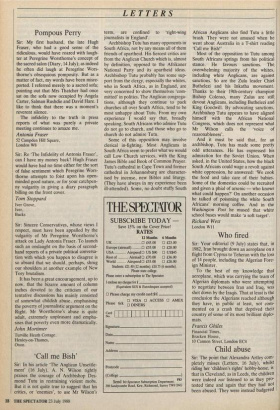`Call me Bish'
Sir: In his article 'The Anglican Unsettle- ment' (16 July), A. N. Wilson rightly praises the courage of Archbishop Des- mond Tutu in restraining violent mobs. But it is not quite true to suggest that his critics, or 'enemies', to use Mr Wilson's
term, are confined to `right-wing journalists in England'.
Archbishop Tutu has many opponents in South Africa, not by any means all of them friends of apartheid. His fiercest critics are from the Anglican Church which is, almost by definition, opposed to the Afrikaner National Party and its apartheid ideas. Archbishop Tutu probably has some sup- port from the clergy, especially the whites, who in South Africa, as in England, are very concerned to show themselves 'com- mitted' in politics. The Anglican congrega- tions, although they continue to pack churches all over South Africa, tend to be most unhappy about Tutu. From my own experience I would say that, broadly speaking, South Africans who admire Tutu do not go to church, and those who go to church do not admire Tutu.
Some of this opposition may involve clerical in-fighting. Most Anglicans in South Africa seem to prefer what we would call Low Church services, with the King James Bible and Book of Common Prayer. Tutu's cathedral in Cape Town and former cathedral in Johannesburg are character- ised by incense, new Bibles and liturgy. (They have always in my experience been ill-attended). Some, no doubt stuffy South African Anglicans also find Tutu a little brash. They were not amused when he went about Australia in a T-shirt reading `Call me Bish!'
Most of the opposition to Tutu among South Africans springs from his political stance. He favours sanctions. The overwhelming majority of the whites, including white Anglicans, are against sanctions. So are the Zulu leader Chief Buthelezi and his Inkatha movement. Thanks to their 19th-century champion Bishop Colenso, many Zulus are still devout Anglicans, including Buthelezi and King Goodwill. By advocating sanctions, Archbishop Tutu appears to have aligned himself with the African National Congress, which does not represent what Mr Wilson calls the 'voice of reasonableness'.
And it must be said that, for an archbishop, Tutu has made some pretty odd utterances. He has expressed his admiration for the Soviet Union. When asked, in the United States, how the black South Africans could wage a revolt against white oppression, he answered: 'We cook the food and take care of their babies. Some of the domestics could be recruited and given a phial of arsenic — who knows what could happen?' On another occasion he talked of poisoning the white South Africans' morning coffee. And in the Washington Post he mused that white school buses would make 'a soft target'.
Richard West
London W11














































 Previous page
Previous page